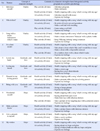Abstract
Purpose
The purpose of this study was to develop a positive psychology-based and character strengths-integrated activity program for elders living alone in rural areas, and then to examine the effectiveness of the program.
Methods
A quasi-experimental pre- and post-test design with a nonequivalent control group was used. The participants included 59 elders in total, of whom 30 were assigned to the experimental group and 29 to the control group. positive psychology-based and character strengths-integrated activity program for elders consists of sixty-minute sessions held twice per week during 6 weeks, hence 12 sessions in total.
Figures and Tables
Table 1
A Character Strengths-based Integrated Activity Program on a Positive Psychology for Elderly Living Alone in Rural Areas

Table 2
Homogeneity Test of General Characteristics in Elderly Living Alone in a Rural Area (N=59)

Table 3
Homogeneity Test of Characteristics in Elderly Living Alone in a Rural Area (N=59)

Table 4
Effectiveness of a Character Strengths-based Integrated Activity Program on Depression, Vitality, Life Satisfaction in Elderly Living Alone in Rural Areas (N=59)

References
1. Statistics Korea. Elderly statistics [Internet]. Daejeon: Statistics Korea;2015. cited 2015 December 2. Available from http://kostat.go.kr/portal/korea/kor_nw/2/6/1/index.board?bmode=read&aSeq=348565.
2. Jeong KH, Oh YH, Kang EN, Kim JH, Son WD, Oh MA. 2014 Survey for elderly. Research Report. Seoul: Ministry of Health and Welfare;2014. 12. Report No.: 11-13520000-00142612.
3. Son JA, Suh SR, Kim MH. Factors related to depression of rural elders. J Korean Gerontol Nurs. 2015; 17(1):56–64. DOI: 10.17079/jkgn.2015.17.1.56.

4. Jeong SS, Kim JS. Comparison of health behaviors and health level between elders living alone and those living with a spouse. Glob Health Nurs. 2014; 4(1):27–36.
5. Kwon SM. Positive personality of human. Seoul: Hakjisa;2011. p. 702.
6. Peterson C, Seligman MEP. Character strengths and virtues: A handbook and classification. New York: Oxford University Press and Washington, DC;2004. p. 816.
7. Seligman ME, Steen TA, Park N, Peterson C. Positive psychology progress: empirical validation of interventions. Am Psychol. 2005; 60(5):410–421.

8. Proyer RT, Gander F, Wellenzohn S, Ruch W. Positive psychology interventions in people aged 50-79 years: Long-term effects of placebo-controlled online interventions on well-being and depression. Aging Ment Health. 2014; 18(8):997–1005. DOI: 10.1080/13607863.2014.899978.
9. Niemiec RM. VIA character strengths: Research and practice (The first 10 years). In : Knoop HH, Delle Fave A, editors. Wellbeing and cultures: Perspectives on positive psychology. New York: Springer;2013. p. 11–30.
10. Song KH. The structural relationship among the health belief, vitality and successful aging of the elderly. J Sport Leis Stud. 2014; 58(1):751–761.

11. Jung MR, Hwang MS. Factors affecting vitality in persons using elderly welfare facilities. J Korean Acad Soc Home Care Nurs. 2014; 21(1):5–13.
12. Choi SJ. A study on the development of measuring scale of the concept of life satisfaction. J Korean Cult Res Inst. 1986; 49:233–258.
13. Lee MS. Factors influencing life satisfaction the elderly living alone. J Korean Acad Adult Nurs. 2004; 16(1):17–26.
14. Jeon MS. The effects of social activity and leisure activity on life satisfaction of the rural elderly. J Korea Contents Assoc. 2014; 14(9):298–310. DOI: 10.5392/JKCA.2014.14.09.298.

15. Kim KM, Kim HY. The systemic contemplation of sadness mediation program applied to internal senior citizens. J Digit Converg. 2015; 13(12):391–400. DOI: 10.14400/JDC.2015.13.12.391.

16. Lee HJ. Developing and testing the effects of a group program for the low income depressed elderly women living alone which integrated positive psychology and solution-focused therapy [dissertation]. [Seoul]: Sungkyunkwan University;2013. 186.
17. Kim SH. Effects of positive psychology-based group art therapy on depression and happiness in the institutionalized elderly [master's thesis]. [Iksan]: Wonkwang University;2013. 19.
18. Han SM. Effectiveness of a character strengths-based positive psychotherapy on depression, life satisfaction, and quality of life among the depressed elderly [dissertation]. [Cheongju]: Chungbuk National University;2012. 77.
19. Lee JA. Effect of group positive psychotherapy program on depressed older adults [dissertation]. [Seoul]: Korea University;2012. 63.
20. Ryan RM, Frederick C. On energy, personality, and health: Subjective vitality as a dynamic reflection of well-being. J Pers. 1997; 65(3):529–565.

21. Kee BS. A preliminary study for the standardization of geriatric depression scale short form-Korea version. J Korean Neuropsychiatr Assoc. 1996; 35(2):298–307.
22. Sheldon KM, Lyubomirsky S. How to increase and sustain positive emotion: the effects of expressing gratitude and visualizing best possible selves. J Posit Psychol. 2006; 1(2):73–82. DOI: 10.1080/17439760500510676.

23. Happiness Research Center in Seoul National University. Happiness textbook. Seoul: Kimyoungsa;2013. p. 164.
24. Kim SI. Relationship among social support, vitality and happiness in elderly participating physical activity program. J Sport Leis Stud. 2012; 49(1):617–629.

25. Lee MY, Kim SI. Effect of therapeutic exercise program on vitality and optimism in elderly. J Sport Leis Stud. 2013; 51(1):465–476.

26. Oh HO. The relationship among self-regulation, vitality and optimism in elderly leisure sport participants. J Sport Leis Stud. 2011; 45(1):637–646.

27. Seligman MEP. Authentic happiness. New York: Free Press;2002. p. 177.




 PDF
PDF ePub
ePub Citation
Citation Print
Print


 XML Download
XML Download